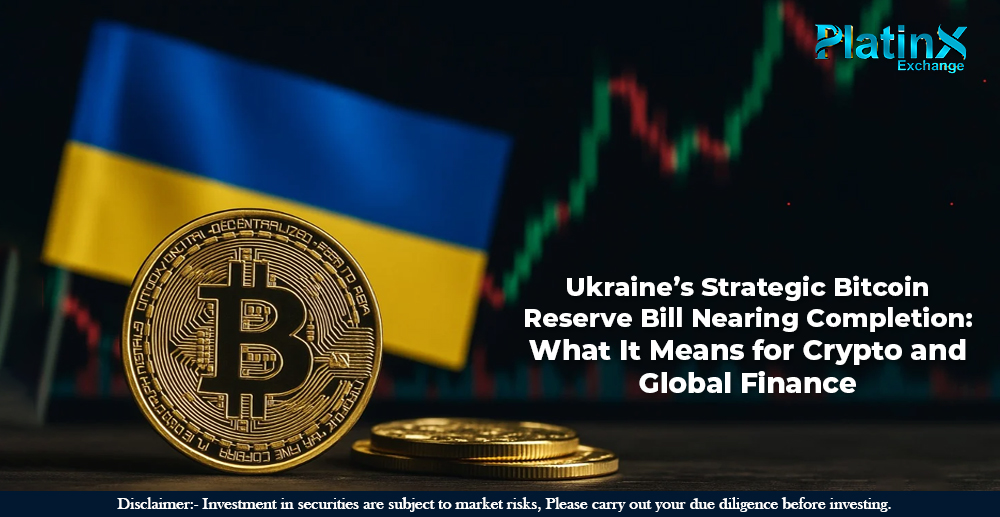In a landmark move that could reshape the global financial landscape, Ukraine is reportedly finalizing a bill to establish a strategic Bitcoin reserve. This bold initiative, currently nearing completion, reflects a growing trend among nations to explore cryptocurrency not just as an investment but as a part of sovereign reserves. As this news circulates, crypto exchanges like Platinx Exchange stand to play a pivotal role in bridging traditional finance with the future of digital assets.
Ukraine’s Bold Step Into Bitcoin Reserves
Ukraine has long been in the spotlight regarding cryptocurrency adoption. Amid ongoing geopolitical challenges and economic volatility, the Ukrainian government’s interest in Bitcoin has evolved from regulatory discussions to concrete legislation aimed at leveraging Bitcoin as a strategic asset.
According to recent reports, Ukrainian lawmakers are preparing to finalize a bill that will officially recognize Bitcoin as part of the country’s national reserve assets. This legislation is intended to allow Ukraine’s central bank to hold Bitcoin and potentially other cryptocurrencies as part of its sovereign wealth management strategy.
Why Bitcoin?
Bitcoin’s appeal to countries like Ukraine stems from several factors:
- Decentralization: Bitcoin operates independently of any central bank or government, offering a hedge against political or economic instability.
- Limited Supply: With a capped supply of 21 million coins, Bitcoin is often seen as “digital gold,” a scarce asset that can preserve value over time.
- Global Acceptance: Increasing adoption by individuals, corporations, and even governments around the world has strengthened Bitcoin’s legitimacy as a store of value.
- Financial Sovereignty: For a country facing sanctions, economic uncertainty, or inflation, Bitcoin offers an alternative reserve asset beyond traditional fiat currencies.
Ukraine’s initiative is groundbreaking because it signals a move beyond using Bitcoin merely as a transactional or investment vehicle toward embracing it as a core component of national financial security.
Implications for Global Finance
If Ukraine successfully passes the bill, it could open the door for other nations to consider cryptocurrencies as part of their official reserves. This would be a significant shift from current norms where sovereign reserves are primarily held in cash, gold, and government bonds.
Potential Benefits
- Diversification: Bitcoin adds diversification to reserve portfolios, reducing dependence on a single currency or asset class.
- Inflation Hedge: In times of inflation or currency devaluation, Bitcoin’s limited supply may help protect the value of reserves.
- Increased Transparency: Blockchain’s public ledger provides a transparent way to audit and verify reserve holdings.
Potential Risks
- Volatility: Bitcoin’s price fluctuations are much higher compared to traditional assets, posing risks to reserve stability.
- Regulatory Challenges: Governments will need to navigate regulatory frameworks to securely and legally hold and transact in cryptocurrencies.
- Security Concerns: Safeguarding digital assets against hacking or loss requires robust cybersecurity infrastructure.
Nonetheless, Ukraine’s bill reflects a growing recognition that cryptocurrencies are becoming integral to the future of money and finance.
The Role of Exchanges Like Platinx Exchange
As Ukraine moves toward officially holding Bitcoin reserves, cryptocurrency exchanges become critical infrastructure in this transition. Platinx Exchange, a leading digital asset platform, stands out for its security, liquidity, and regulatory compliance — all vital for institutional-level transactions.
Why Platinx Exchange?
- Security First: Platinx Exchange employs advanced security measures such as multi-signature wallets, cold storage, and real-time monitoring to protect assets.
- High Liquidity: The platform offers high liquidity across major cryptocurrencies, facilitating large-volume trades without significant price impact.
- Regulatory Compliance: Platinx is committed to KYC/AML protocols, ensuring that institutional clients like central banks can comply with international laws.
- User-Friendly Interface: Even for complex operations, Platinx provides intuitive tools for managing crypto portfolios.
- Global Reach: Supporting multiple fiat currencies and serving users worldwide, Platinx Exchange is well-positioned to support sovereign reserve management.
By partnering with trusted exchanges like Platinx, Ukraine can ensure the secure acquisition, custody, and management of Bitcoin reserves while maintaining transparency and compliance.
How Ukraine’s Bitcoin Reserve Could Work in Practice
While the full details of Ukraine’s bill remain under wraps, we can speculate how a strategic Bitcoin reserve might be implemented based on industry trends:
- Reserve Allocation: The central bank allocates a certain percentage of its foreign reserves to Bitcoin, balancing risk and reward.
- Secure Custody: Bitcoin is stored using cold wallets or through custodial partners with institutional-grade security.
- Periodic Audits: Blockchain technology enables transparent audits, reassuring the public and international partners.
- Monetary Policy Integration: Bitcoin holdings may be used to hedge against currency devaluation or to stabilize the national currency.
- Liquidity Management: The reserve can be partially liquidated or exchanged as needed during economic crises or to fund public initiatives.
This hybrid approach blends traditional monetary policy with the innovative advantages of decentralized digital assets.
What This Means for Investors and the Crypto Market
Ukraine’s move signals increasing institutional adoption of Bitcoin, which could have profound effects on the broader market:
- Legitimization: When sovereign nations officially hold Bitcoin, it sends a strong message that cryptocurrencies are here to stay.
- Price Impact: Large-scale purchases by governments could reduce Bitcoin’s circulating supply and contribute to price appreciation.
- New Investment Products: Institutional demand might spur new financial instruments tied to government-held cryptocurrencies.
- Regulatory Momentum: Other countries may feel encouraged to develop clearer crypto regulations, benefiting global market stability.
For retail investors and crypto enthusiasts, Ukraine’s strategic reserve bill could mark a tipping point toward widespread acceptance and integration of Bitcoin in mainstream finance.
Challenges Ukraine Faces
Despite the optimism, Ukraine’s path will not be without challenges:
- Political Risk: Continued conflict and political instability could complicate implementation.
- Regulatory Scrutiny: International bodies such as the IMF may pressure Ukraine on crypto reserve holdings.
- Technological Readiness: Ukraine’s central bank must develop the technical expertise to manage digital assets safely.
- Market Volatility: Bitcoin’s inherent price swings require careful risk management to avoid destabilizing national finances.
However, Ukraine’s proactive approach reflects a willingness to innovate amid adversity, potentially positioning the country as a global crypto pioneer.
Looking Ahead: The Future of National Crypto Reserves
Ukraine’s strategic Bitcoin reserve bill is part of a broader trend toward “digital asset sovereign reserves.” Countries like El Salvador have already adopted Bitcoin as legal tender, while others, including Switzerland and Singapore, explore ways to incorporate crypto into financial systems.
As more governments experiment with digital currencies—whether central bank digital currencies (CBDCs) or cryptocurrencies like Bitcoin—the line between traditional finance and blockchain technology continues to blur.
Exchanges like Platinx Exchange will be key enablers in this evolution, providing the infrastructure and security necessary for institutional adoption. With platforms that prioritize transparency, security, and compliance, governments can confidently integrate digital assets into their financial strategies.
Conclusion
Ukraine’s near-finalization of its strategic Bitcoin reserve bill marks a historic moment in the intersection of cryptocurrency and sovereign finance. This initiative could inspire a wave of similar moves worldwide, accelerating the acceptance of Bitcoin as a legitimate reserve asset.
For investors, crypto platforms, and governments alike, this development underscores the importance of embracing innovative financial tools while navigating the challenges of security and regulation.
With trusted exchanges like Platinx Exchange facilitating access to secure and compliant crypto trading, the future of national Bitcoin reserves looks promising. Ukraine’s bold step is a clear signal that cryptocurrencies are transitioning from niche assets to integral components of the global financial ecosystem.
If you want to learn more about how to safely invest or manage cryptocurrencies as part of your portfolio, or institutional holdings, check out Platinx Exchange — your gateway to secure, transparent, and professional digital asset trading.

